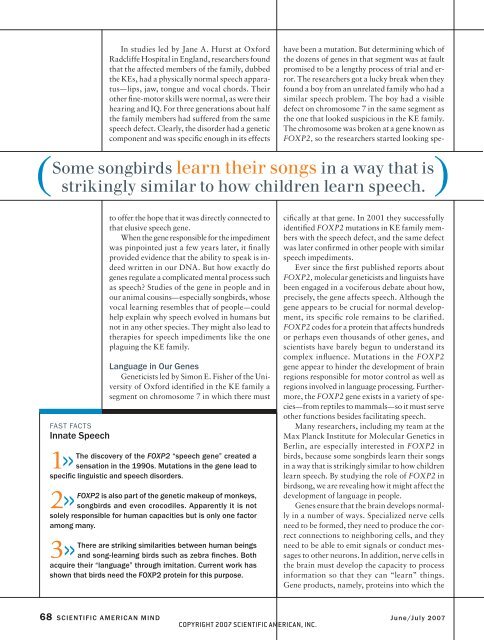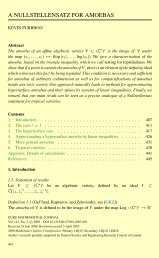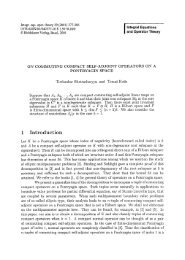Scientific American Mind-June/July 2007
Scientific American Mind-June/July 2007
Scientific American Mind-June/July 2007
You also want an ePaper? Increase the reach of your titles
YUMPU automatically turns print PDFs into web optimized ePapers that Google loves.
FAST FACTS<br />
Innate Speech<br />
1>><br />
In studies led by Jane A. Hurst at Oxford<br />
Radcliffe Hospital in England, researchers found<br />
that the affected members of the family, dubbed<br />
the KEs, had a physically normal speech apparatus—lips,<br />
jaw, tongue and vocal chords. Their<br />
other fi ne-motor skills were normal, as were their<br />
hearing and IQ. For three generations about half<br />
the family members had suffered from the same<br />
speech defect. Clearly, the disorder had a genetic<br />
component and was specifi c enough in its effects<br />
to offer the hope that it was directly connected to<br />
that elusive speech gene.<br />
When the gene responsible for the im pediment<br />
was pinpointed just a few years later, it fi nally<br />
provided evidence that the ability to speak is indeed<br />
written in our DNA. But how exactly do<br />
genes regulate a complicated mental process such<br />
as speech? Studies of the gene in people and in<br />
our animal cousins—especially songbirds, whose<br />
vocal learning resembles that of people—could<br />
help explain why speech evolved in humans but<br />
not in any other species. They might also lead to<br />
therapies for speech impediments like the one<br />
plaguing the KE family.<br />
Language in Our Genes<br />
Geneticists led by Simon E. Fisher of the University<br />
of Oxford identifi ed in the KE family a<br />
segment on chromosome 7 in which there must<br />
The discovery of the FOXP2 “speech gene” created a<br />
sensation in the 1990s. Mutations in the gene lead to<br />
specifi c linguistic and speech disorders.<br />
2>><br />
FOXP2 is also part of the genetic makeup of monkeys,<br />
songbirds and even crocodiles. Apparently it is not<br />
solely responsible for human capacities but is only one factor<br />
among many.<br />
have been a mutation. But determining which of<br />
the dozens of genes in that segment was at fault<br />
promised to be a lengthy process of trial and error.<br />
The researchers got a lucky break when they<br />
found a boy from an unrelated family who had a<br />
similar speech problem. The boy had a visible<br />
defect on chromosome 7 in the same segment as<br />
the one that looked suspicious in the KE family.<br />
The chromosome was broken at a gene known as<br />
FOXP2, so the researchers started looking spe-<br />
( Some songbirds learn their songs in a way that is )<br />
strikingly similar to how children learn speech.<br />
3>><br />
There are striking similarities between human beings<br />
and song-learning birds such as zebra fi nches. Both<br />
acquire their “language” through imitation. Current work has<br />
shown that birds need the FOXP2 protein for this purpose.<br />
cifi cally at that gene. In 2001 they successfully<br />
identifi ed FOXP2 mutations in KE family members<br />
with the speech defect, and the same defect<br />
was later confi rmed in other people with similar<br />
speech impediments.<br />
Ever since the fi rst published reports about<br />
FOXP2, molecular geneticists and linguists have<br />
been engaged in a vociferous debate about how,<br />
precisely, the gene affects speech. Although the<br />
gene appears to be crucial for normal development,<br />
its specifi c role remains to be clarifi ed.<br />
FOXP2 codes for a protein that affects hundreds<br />
or perhaps even thousands of other genes, and<br />
scientists have barely begun to understand its<br />
complex infl uence. Mutations in the FOXP2<br />
gene appear to hinder the development of brain<br />
regions responsible for motor control as well as<br />
regions involved in language processing. Furthermore,<br />
the FOXP2 gene exists in a variety of species—from<br />
reptiles to mammals—so it must serve<br />
other functions besides facilitating speech.<br />
Many researchers, including my team at the<br />
Max Planck Institute for Molecular Genetics in<br />
Berlin, are especially interested in FOXP2 in<br />
birds, because some songbirds learn their songs<br />
in a way that is strikingly similar to how children<br />
learn speech. By studying the role of FOXP2 in<br />
birdsong, we are revealing how it might affect the<br />
development of language in people.<br />
Genes ensure that the brain develops normally<br />
in a number of ways. Specialized nerve cells<br />
need to be formed, they need to produce the correct<br />
connections to neighboring cells, and they<br />
need to be able to emit signals or conduct messages<br />
to other neurons. In addition, nerve cells in<br />
the brain must develop the capacity to process<br />
information so that they can “learn” things.<br />
Gene products, namely, proteins into which the<br />
68 SCIENTIFIC AMERICAN MIND <strong>June</strong>/<strong>July</strong> <strong>2007</strong><br />
COPYRIGHT <strong>2007</strong> SCIENTIFIC AMERICAN, INC.

















